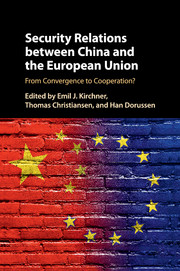Book contents
- Frontmatter
- Dedication
- Contents
- List of Tables
- Preface and Acknowledgements
- Abbreviations
- List of Contributors
- 1 EU–China Security Cooperation in Context
- 2 Chinese and EU Views of Military Security: Crafting Cooperation
- 3 Regional Solutions for Regional Confl icts? The EU, China and their Respective Neighborhoods
- 4 Aims versus Deeds: EU–China Cooperation in Nuclear Nonproliferation
- 5 Terrorism and Organized Crime: Common Concerns but Different Interests
- 6 Chinese and EU Climate and Energy Security Policy
- 7 Competing or Converging Claims on International Order? The EU, China and Human Security
- 8 Civil Protection: Identifying Opportunities for Collaboration
- 9 Cybersecurity and EU–China Relations
- 10 The Economic Security Dimension of the EU–China Relationship: Puzzles and Prospects
- 11 Is Securitizing Migration a Mandatory Choice? Lessons from the EU and China
- 12 Against the Odds: (Considerable) Convergence and (Limited) Cooperation in EU–China Security Relations
- Index
- References
10 - The Economic Security Dimension of the EU–China Relationship: Puzzles and Prospects
Published online by Cambridge University Press: 05 September 2016
- Frontmatter
- Dedication
- Contents
- List of Tables
- Preface and Acknowledgements
- Abbreviations
- List of Contributors
- 1 EU–China Security Cooperation in Context
- 2 Chinese and EU Views of Military Security: Crafting Cooperation
- 3 Regional Solutions for Regional Confl icts? The EU, China and their Respective Neighborhoods
- 4 Aims versus Deeds: EU–China Cooperation in Nuclear Nonproliferation
- 5 Terrorism and Organized Crime: Common Concerns but Different Interests
- 6 Chinese and EU Climate and Energy Security Policy
- 7 Competing or Converging Claims on International Order? The EU, China and Human Security
- 8 Civil Protection: Identifying Opportunities for Collaboration
- 9 Cybersecurity and EU–China Relations
- 10 The Economic Security Dimension of the EU–China Relationship: Puzzles and Prospects
- 11 Is Securitizing Migration a Mandatory Choice? Lessons from the EU and China
- 12 Against the Odds: (Considerable) Convergence and (Limited) Cooperation in EU–China Security Relations
- Index
- References
Summary
Economic Security, the EU and China
Economic security relates to the strategic ability of states to maintain and develop their socioeconomic system of choice and their relative economic power position under conditions of anarchy. In today's globalized world, the economic dimension of security is gaining in importance. Increasingly, threats in this realm flow from the eroded policy autonomy of major states, which reflects the heightened interdependence in the real, financial and monetary sectors of the global economy. This erosion of autonomy is exacerbated by external uncertainty, the instability of an international system that is undergoing fundamental change. China's re-emergence and mounting influence – and that of other emerging countries for that matter – is not only affecting Western developed nations’ position in the global distribution of capabilities, it also constitutes a challenge of sorts to their very identity (Geeraerts 2011; Kupchan 2012). The successful economic growth of such an idiosyncratic power as China defies the present international order, which largely mirrors the Western worldview of liberal democracy and free markets (Foot 2009; Layne 2012). While, for more than half a century, the United States, in tandem with the EU, has watched over the provision of global public goods such as monetary stability and free trade, and has propagated the practice of good governance, human rights, international trade regulations, humanitarian intervention and state-building, recently the credibility of the United States and EU as political drivers of global governance has been put to the test (Kupchan 2012: Acharya 2014). As much as the United States, weighed by debt and deficits, is struggling to maintain its superpower status, the EU, faced with the eurozone debt crisis, is struggling for its very survival.
Meanwhile, China's growing economic clout has increased its political influence well beyond its borders and is turning it into a more confident player. Gradually, Beijing is also developing an alternative discourse of modernity and spelling out its own narratives of global governance (Schweller and Xiao Pu 2011; Pan 2012; Breslin 2013). Part of these narratives question the present global governance regime's ability to provide economic and monetary stability, as well as its authority in setting norms of good governance. As a rule, emerging powers tend to be suspicious of existing international regimes which tend to favor established powers.
- Type
- Chapter
- Information
- Security Relations between China and the European UnionFrom Convergence to Cooperation?, pp. 187 - 208Publisher: Cambridge University PressPrint publication year: 2016
References
- 3
- Cited by

